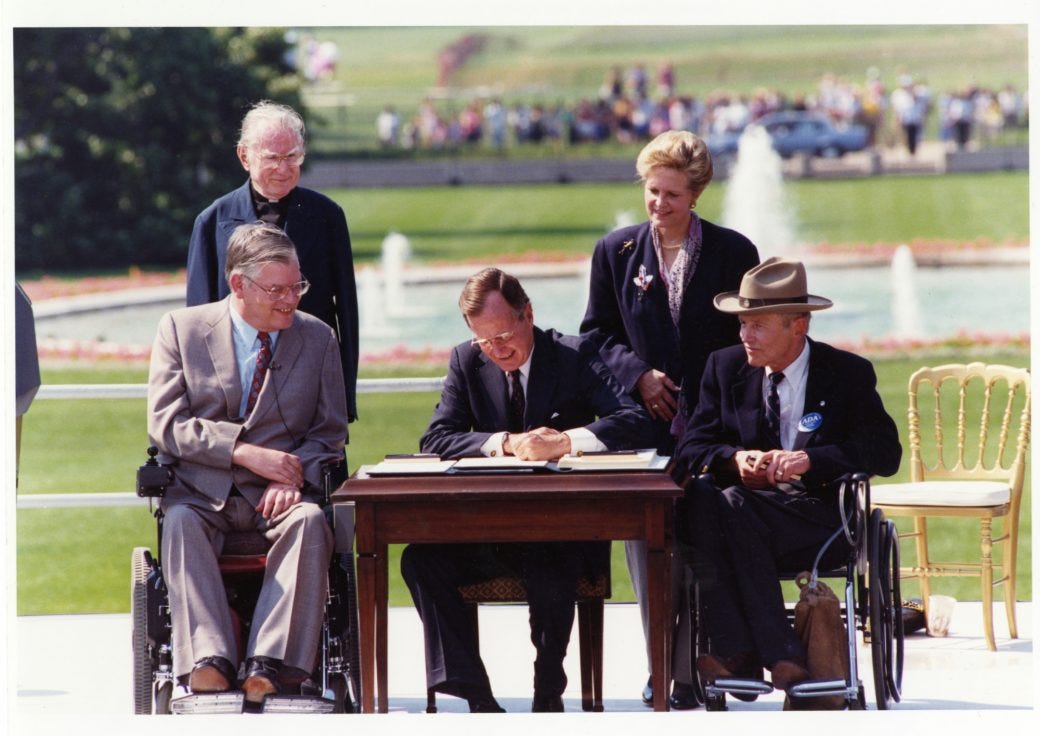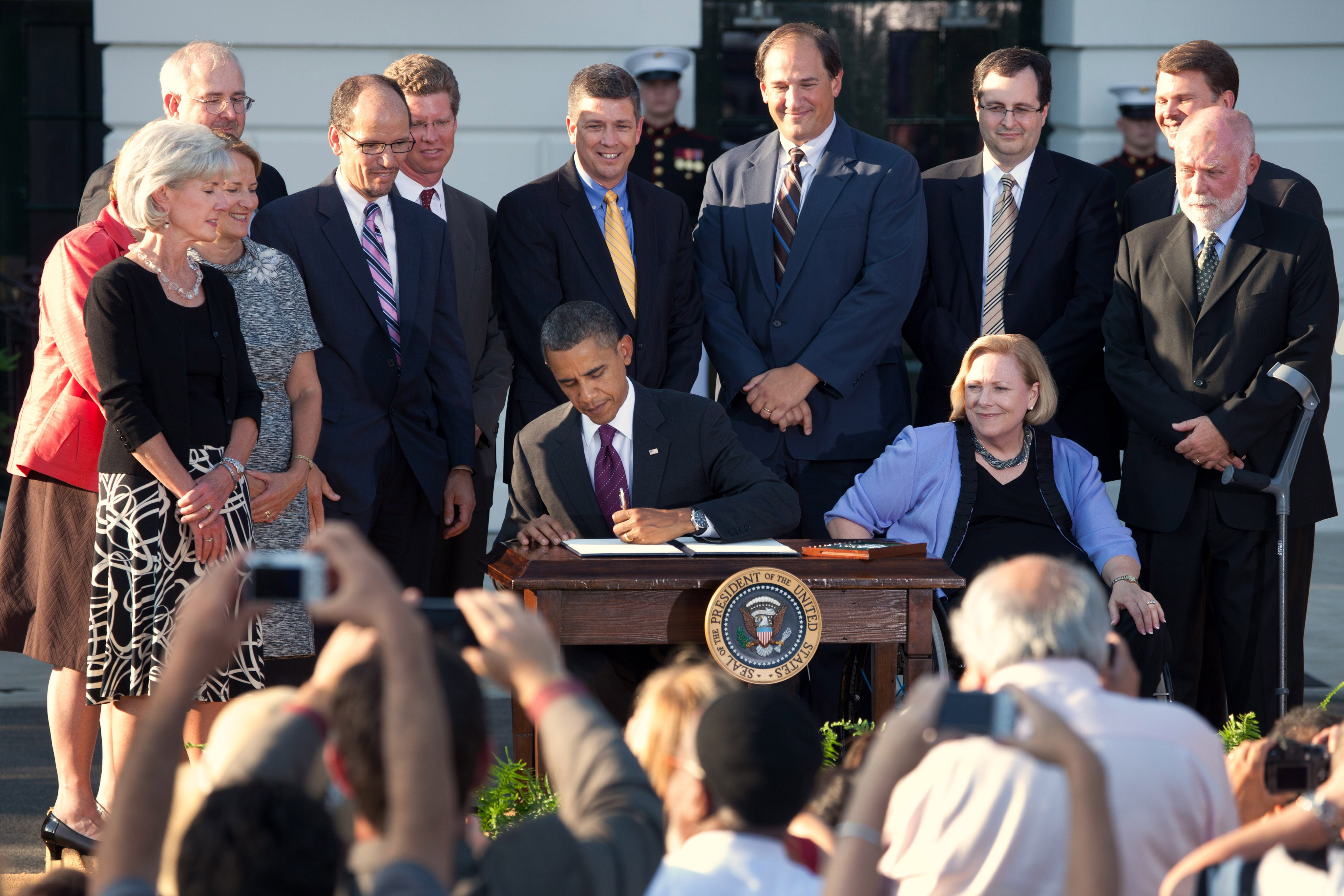The Department of Health Human Services has been helping ensure people with disabilities receive equal access to healthcare and community support.
By Munr Kazmir | Kazmir.org
Jul 27, 2020

Secretary of Health and Human Services Alex Azar addresses his remarks at the National Dialogue on Safely Reopening America’s Schools Tuesday, July 7, 2020, in the East Room of the White House. (Official White House Photo by Andrea Hanks)
The Americans With Disabilities Act Turns 30
Sunday, July 26, 2020, marked the 30th anniversary of the historic signing of the Americans with Disabilities Act. The passage of that groundbreaking piece of legislation was much more than just a landmark moment for Americans with disabilities.
When the ADA was signed into law on July 26, 1990, America became the first nation to adopt a comprehensive, formal declaration of the basic civil rights of people with disabilities.
“The ADA was a formal acknowledgement that Americans with disabilities are Americans first, and they are entitled to the same rights and freedoms as everybody else: a right to belong and participate fully in the American experience; a right to dignity and respect in the workplace and beyond; the freedom to make of our lives what we will.” — President Barack Obama, 2009
At its passage, the ADA marked the culmination of years of hard work by people with disabilities, civil rights attorneys, crusaders and advocates.
The influential white-paper, “Toward Independence: An assessment of Federal Laws and Programs Affecting Persons with Disabilities- With Legislative Recommendations,” was released by the National Council on the Handicapped (now the National Council on Disability) in 1986.
One of the key legislative recommendations called for the enactment by Congress of a “comprehensive” equal opportunity law, “perhaps under such a title as, ‘The Americans with Disabilities Act of 1986’”.
A Congressional task force was created to answer the call of “Toward Independence”: “To establish a clear and comprehensive prohibition of discrimination on the basis of handicap,” was its expressly stated goal by 1988. In 1989, the Americans with Disabilities Act passed the Senate. In 1990, it was passed by the House.
In July of that year, President George H.W. Bush signed it into law.

Since then, subsequent presidential administrations have improved on and expanded the original mandates of the ADA.
Former Presidents Bill Clinton, George W. Bush and Barack Obama all took essential steps to help ensure the civil rights of people with different abilities.

The ADA in 2020
As the ADA turns 30, Americans with disabilities are in the midst of a new threat and a new administration has risen admirably to take on the challenge.
The U.S. Department of Health and Human Services, headed by Secretary Alex Azar, has been central in efforts to help Americans with disabilities cope with the many challenges COVID-19 has created.
“We’ve fought to ensure equal access to healthcare by preventing Americans with disabilities from being denied access to organ transplants and COVID-19 treatment. We’ve worked to protect the rights of Americans with disabilities to be parents, we’ve improved and expanded services that support independent living, and we’ve launched an unprecedented effort on new employment opportunities for people with disabilities.” — HHS Secretary Alex Azar
The Department of Health and Human Services has been working quietly on the front-lines of this health crisis to ensure that Americans with disabilities receive equal access to every available COVID-19 treatment.
The HHS has quashed ventilator rationing guidelines that excluded patients with profound intellectual disabilities. The agency has worked diligently to make sure hospital visitor guidelines include support-persons for people who need help understanding their care.
Secretary Azar and the Department of Health and Human Services have faced unprecedented challenges caused by the specific nature of COVID-19. Most people long-term care homes and hospice programs are protected by the Americans with Disabilities Act.
The HHS has been working to ensure states and hospitals do not deny life-saving care during this crisis based on stereotypes about age or disability.
Besides defending the healthcare rights of Americans with disabilities, the HHS has also been working to support other critical needs during COVID-19.
Through the CARES Act, a record $85 million in direct funding was recently awarded to over 350 Centers for Independent Living (CILs). These community-based organizations are run by and for individuals with disabilities.
To help people with disabilities maintain their independence during the COVID-19 crisis, these organizations have provided food and prepared meals, helped with personal care and provided protective equipment.
Keeping the continuity of support services like housing and medical care has been paramount. The support of the HHS has been critical in these efforts.
From alternative transportation to medical appointments, to expanded virtual options for health care, the agencies under the HHS have responded with innovation and compassion.
The basic civil right of persons with disabilities is universal accessibility: Jobs, public service, accessible public spaces, telecommunications, technology and healthcare.
The march toward that goal continues today. With Alex Azar at the helm of the HHS, Americans with disabilities have a champion undaunted by the challenges of COVID-19.
Under Azar’s leadership, the U.S. Department of Health and Human Services will continue to advocate for the rights of all Americans with disabilities to receive equal access to quality care and community support services.
(contributing writer, Brooke Bell)

